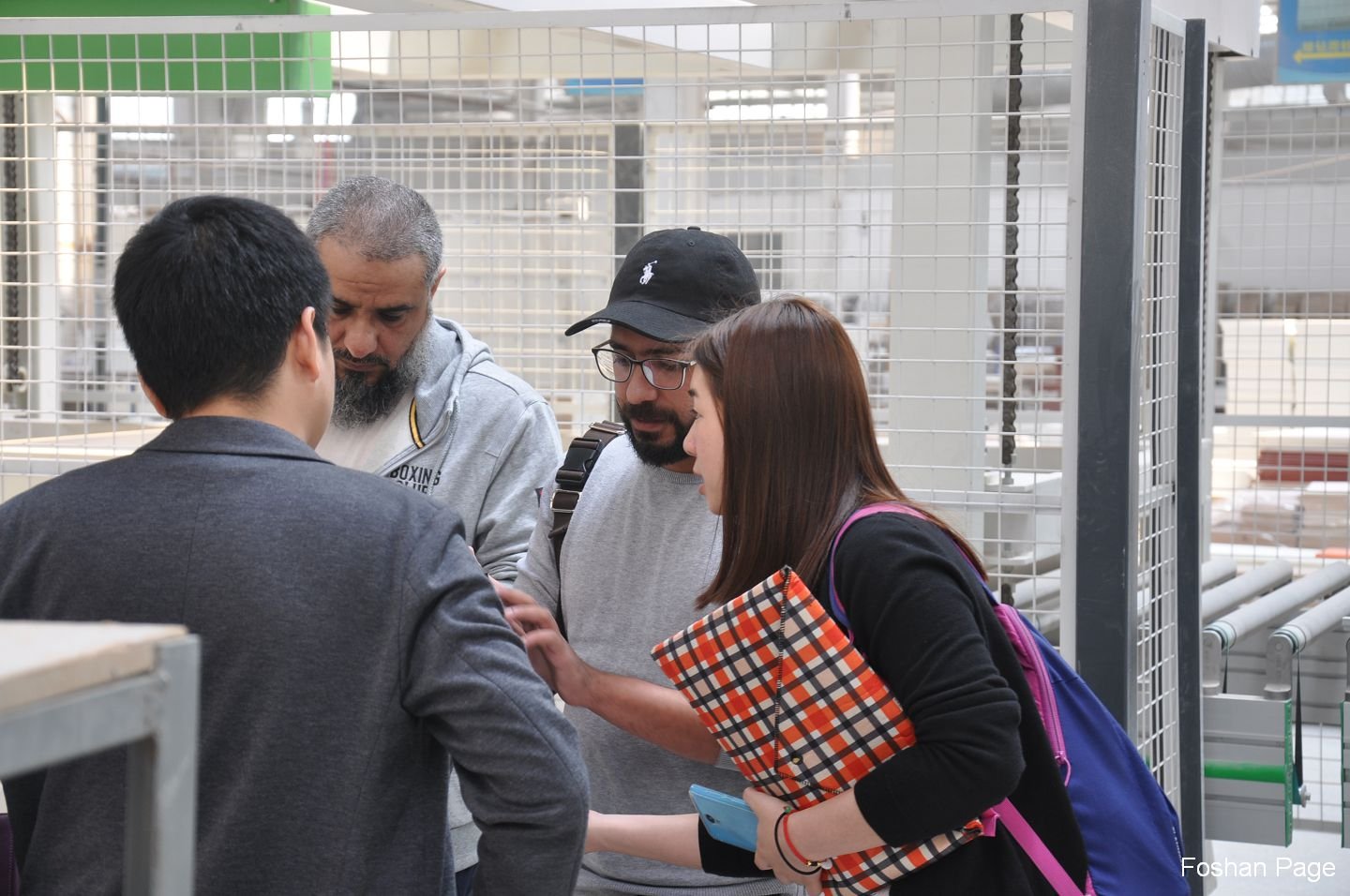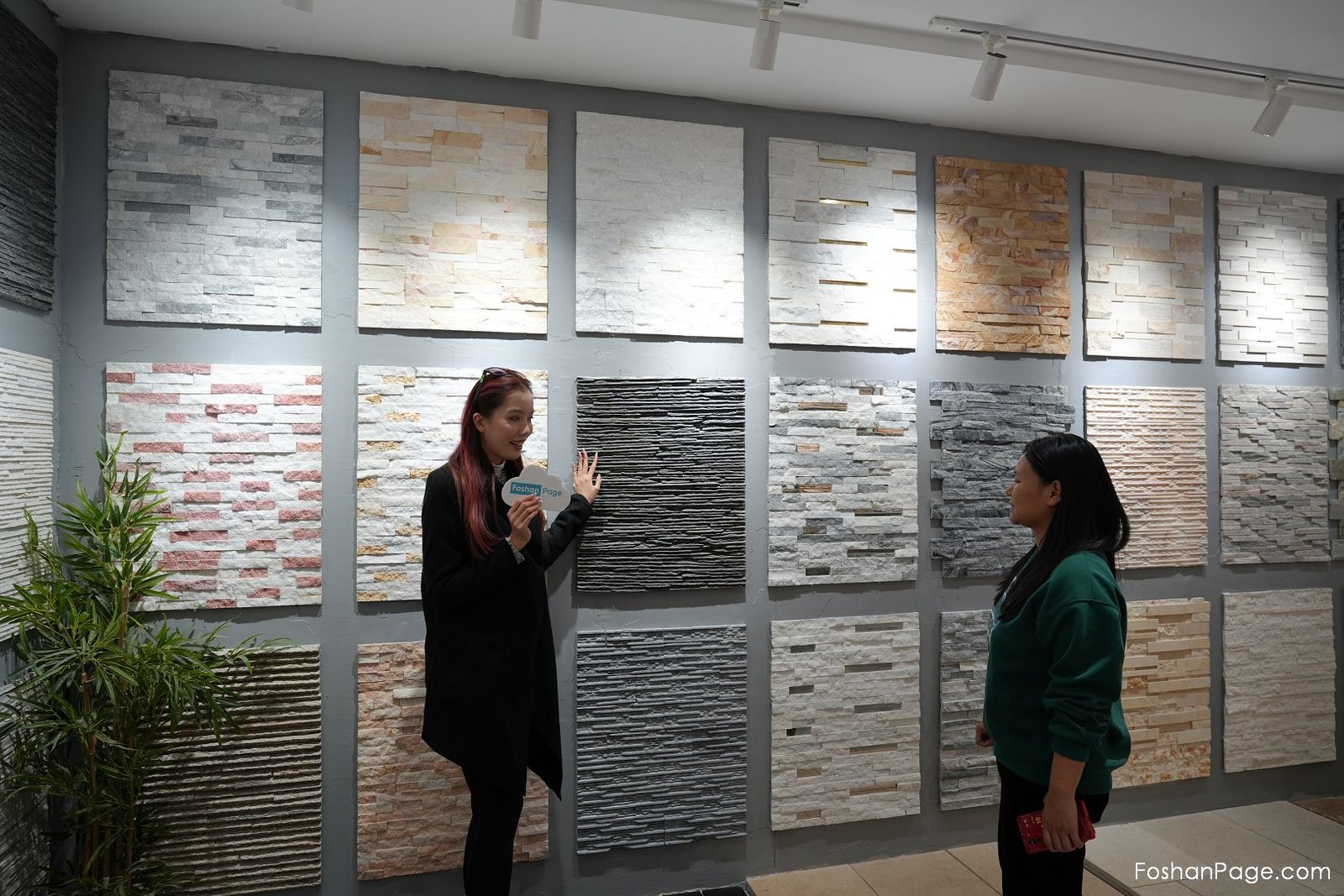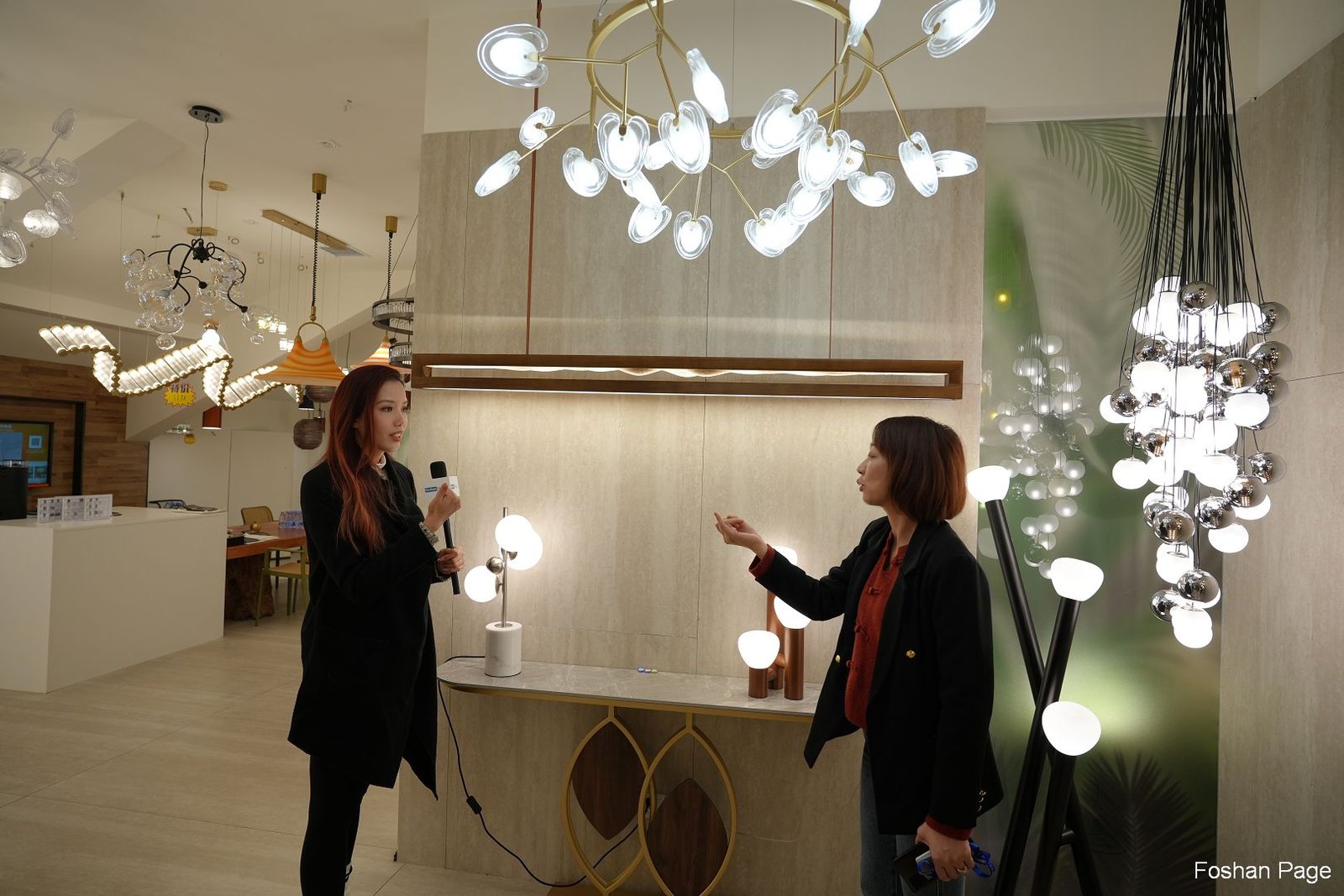Article Overview
ToggleNew to Buying in Foshan?
Foshan, China is one of the world’s largest hubs for building materials sourcing. From big tile markets to specialized lighting centers, sanitary ware halls, and furniture megamalls, the city attracts thousands of international buyers every year. But while the opportunities are vast, the risks for first-time buyers are equally real. Misunderstandings, vague paperwork, and missed details can quickly turn what seems like a bargain into a costly mistake.
Based on real sourcing cases and on-the-ground market visits, here are 10 common mistakes buyers make in Foshan markets — and how to avoid them.
1. Not Bringing Project References
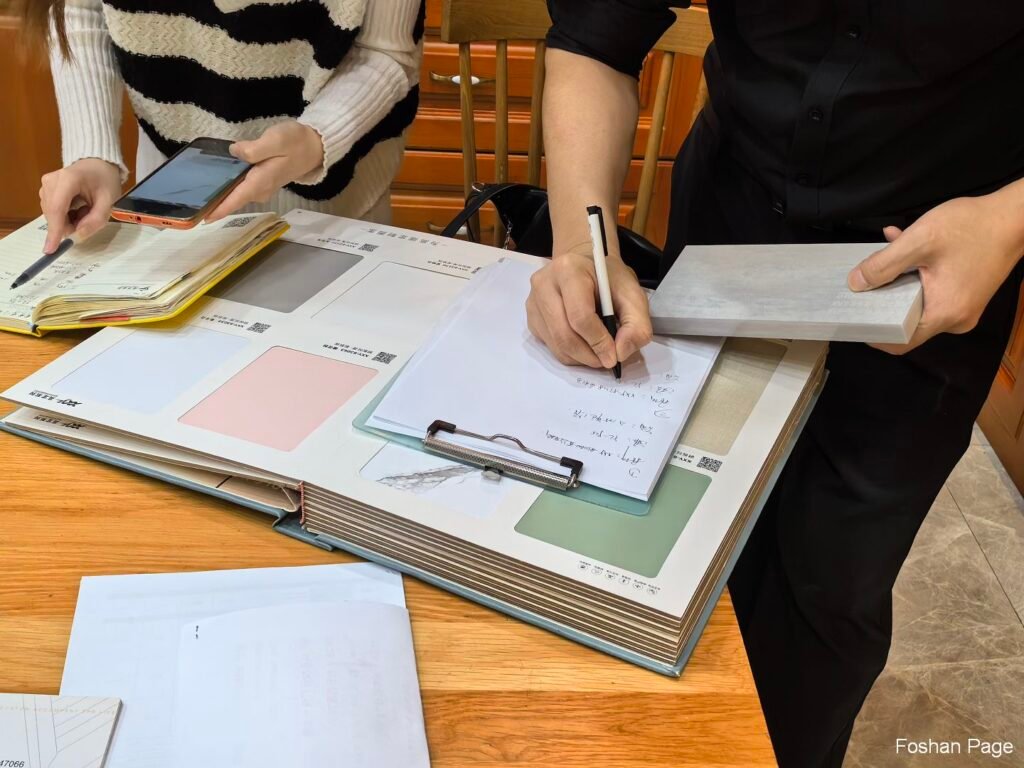
If you didn’t bring floor plans, mood boards, or a clear Bill of Quantity (BOQ), then the suppliers can’t provide accurate quotations or recommendations. Communication slows down, and mistakes in quantity calculation are almost guaranteed.
Tip: Bring CAD layout drawings (ideally A3 prints) and a BOQ that specifies which products, sizes, and quantities are needed for each area. For tiles, this is essential to avoid costly miscalculations. You should ask the architect work out the size and quantity.
Case: One client arrived with no drawings and was quite struggling to describe their needs. Another client brought a complete BOQ with floor plans — the supplier quickly matched products and issued a precise quotation. The difference in efficiency was night and day.
2. Relying Solely on Photos or Catalogs
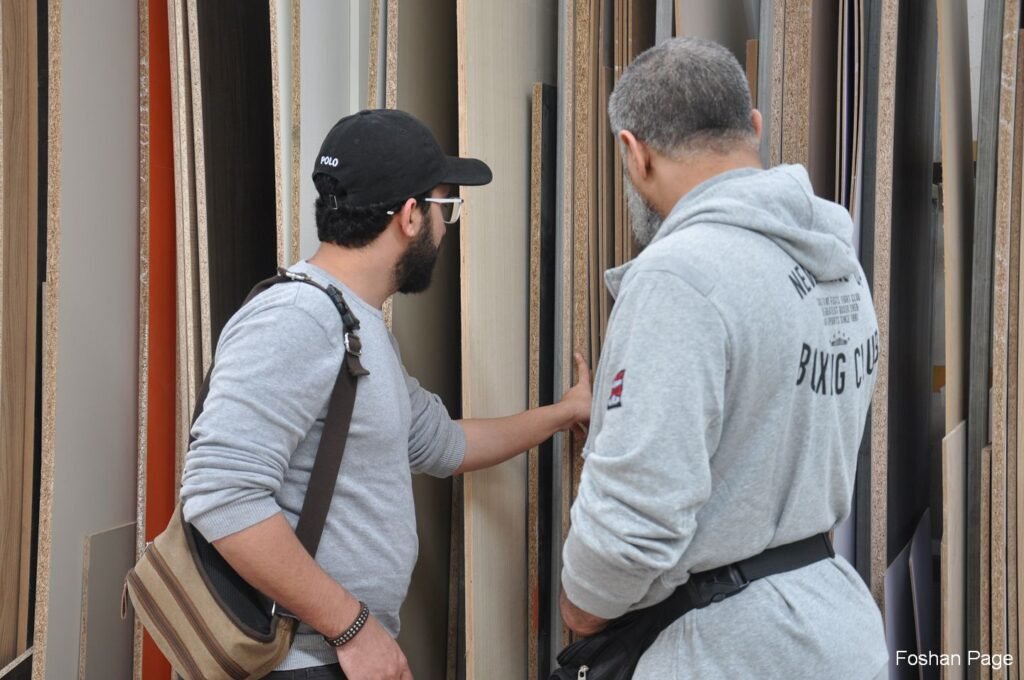
Please note that showroom photos and catalogs rarely reflect the true look and feel of a product. Colors could shift under different lighting, and textures can’t be judged on a phone screen.
Tip: Always handle real samples, and view them in natural daylight when possible. If you can take sample pieces back to compare with your design palette, that would be good.
Case: A client wanted light grey antique-look tiles. The supplier only had dark grey on display, so they showed a phone photo of the lighter shade. The client agreed, but when the shipment arrived, the tiles were far paler than expected. With no return option, the client had to install them, and the final interior color scheme no longer matched the original design vision.
3. Paying “Goodwill Deposits” Too Easily
Here in the market, many sales staff may pressure clients with lines like: “This special discount is only valid today — just leave $200 to secure it.” Once you pay, it becomes difficult to walk away, even if you later find a better supplier or need changes.
Tip: Never pay deposits unless specifications, terms, and prices are confirmed in writing. Or pay when you completely satisfied with the price and quality.
Case: We have a client was looking for lighting in a showroom, he paid a $100 deposit after tough negotiations. Soon after, they realized they wanted an extra feature added. The supplier agreed, but only at a higher price. The buyer felt the upsell was unfair but also didn’t want to forfeit the $100. That small deposit effectively trapped them.
4. Relying on an Oversimplified Order Sheet
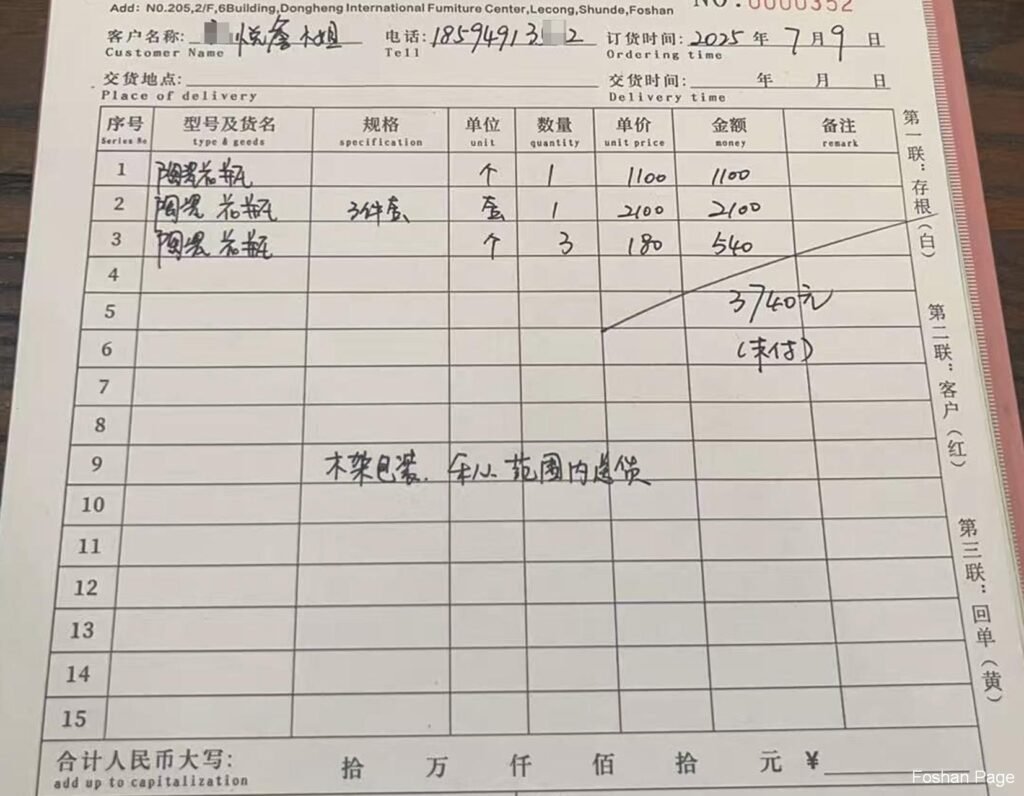
Many suppliers often issue very simple order slips with only product name, quantity, and unit price. Key details — materials, finishes, dimensions, delivery dates — may be missing, leading to disputes later. You might think that you both discussed clearly but after time pass, the supplier might forgot the details.
Tip: Ensure order sheets include material, color, size, delivery terms, and any agreed customizations. For you to remember after 2 or 3 months time. However, here most supplier only give slips in Chinese, you might need to have a translator review it.
Case: One client ordered 10 showroom room in Foshan. The supplier only gave a simple order slip showing product name, quantities and unit price. They didn’t mention glass thickness, door direction and hardware specification etc. The client said this supplier has good attitude and was happy to deal with them. But weeks later, the shipment arrived with silver shining handles, not the black matte finish. The supplier insisted that the order slip didn’t mention black handles. After negotiation, the supplier was able to replace handles but the shipping was delayed.
5. Communicating Without a Translator
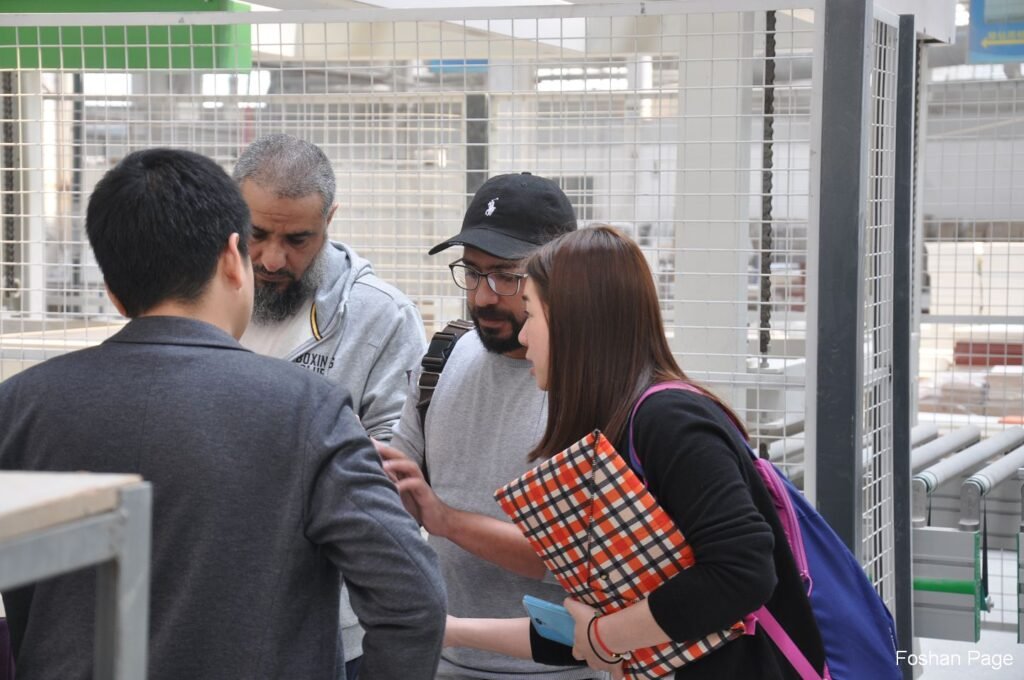
Most suppliers in Foshan speak little or no English. Relying on translation apps or hand gestures often causes misunderstandings, especially for technical details.
Tip: Hire a translator (typically $60–80/day). A translator can guide you around the market and help with correct translation. An experienced interpreter familiar with building materials could be more expensive, but they know better about building materials and will save you time and prevent costly mistakes.
Case: We saw a buyer attempt to order stainless steel hardware using only an app. The supplier can not understand English and misunderstood and prepared chrome-plated products. By the time the error was discovered, production had started, then the client have to either accept the wrong items or pay extra for corrections.
6. Only Visiting One Market
Foshan has specialized markets for tiles, lighting, sanitary ware, furniture, and more. Many buyers stop at just one market, missing out on better prices and options elsewhere. Sometimes, they don’t even know where are the other markets.
Tip: You can plan 3-4 days to compare multiple markets. Here in Foshan there are professional market like Foshan Ceramic Exhibition Center and Cihai International, they are only for ceramic tiles, and Shunle Lighting City is mainly for lighting. Like Huayi Market is for mixed building materials like doors, windows, lighting, hardware, kitchen, tiles etc. So you should plan to visit the market according to your project request.
Case: A customer placed an order for 500 square meters of 800x800mm full-body marble tiles at Foshan Hongyi Building Materials Market. He liked the style and found the price acceptable, so he confirmed the purchase on the spot.
However, later while passing by another specialized tile market, he decided to take a look. To his surprise, many of the suppliers there were sourcing the exact same tiles from the same factory — but the price was $1 per square meter lower here. Instantly, he felt like he had overpaid.
7. Assuming Every Showroom Is a Factory
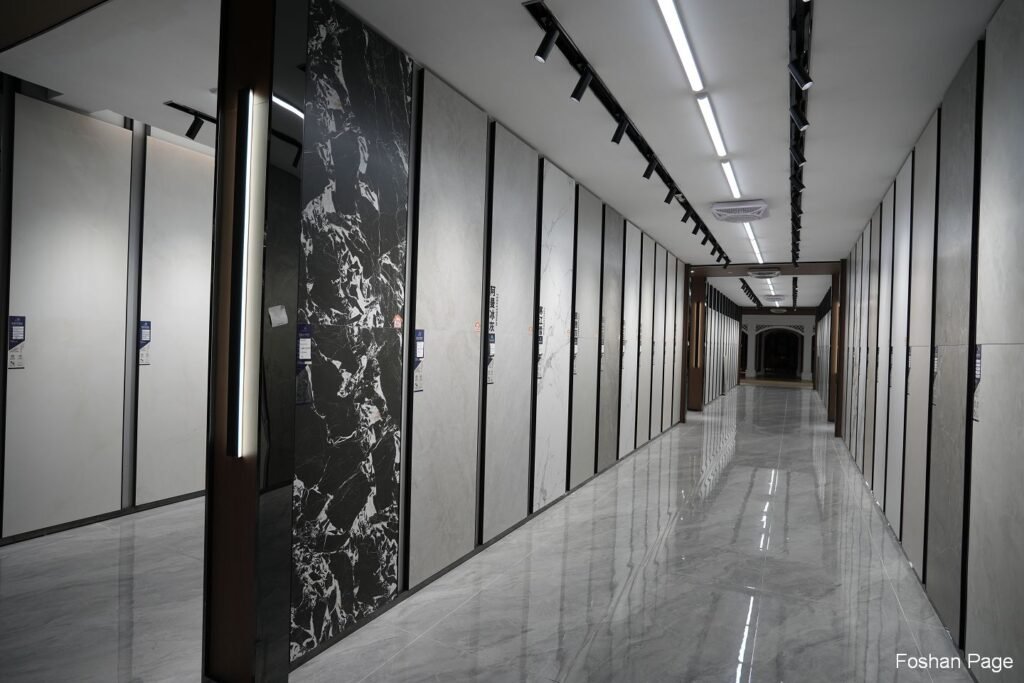
Not all showrooms are run by manufacturers. Many are traders or distributors — even if the word “Factory” appears on the sign.
Tip: Some shops are directly operated by factories, but most are run by trading companies or distributors.
There’s a common misconception that factory-run showrooms always offer the lowest prices — in fact, they may require higher MOQs.
Meanwhile, some distributors consolidate large volumes from various factories, which gives them stronger bargaining power and more competitive pricing, along with better service packages.
If you’re determined to buy directly from a factory, ask the supplier clearly where the production site is located, and whether it’s possible to visit the factory in person.
8. Not Asking About Export Standards
Some products in Foshan are built for the domestic market and don’t meet overseas regulations. For example like voltage, plug types, and certifications.
Tips: Make sure the product is export-ready. For example, electrical plugs in China typically follow the Chinese national standard. If you need UK or US plug types, you must clearly communicate this to the supplier and confirm whether any extra fees apply for such modifications.
In another case, sanitary hardware products exported to Australia require Watermark certification, so it’s essential to ask whether the supplier can meet this compliance requirement.
Case: One UK buyer failed to confirm the local import standards and purchased 20 sets of aluminum doors and windows in Foshan. When the goods arrived at the destination port, the customs required a PAS24 certification — which the supplier couldn’t provide. As a result, the shipment couldn’t be imported and was ultimately abandoned and destroyed at port, causing a significant loss for the buyer.
9. Forgetting to Check Packaging
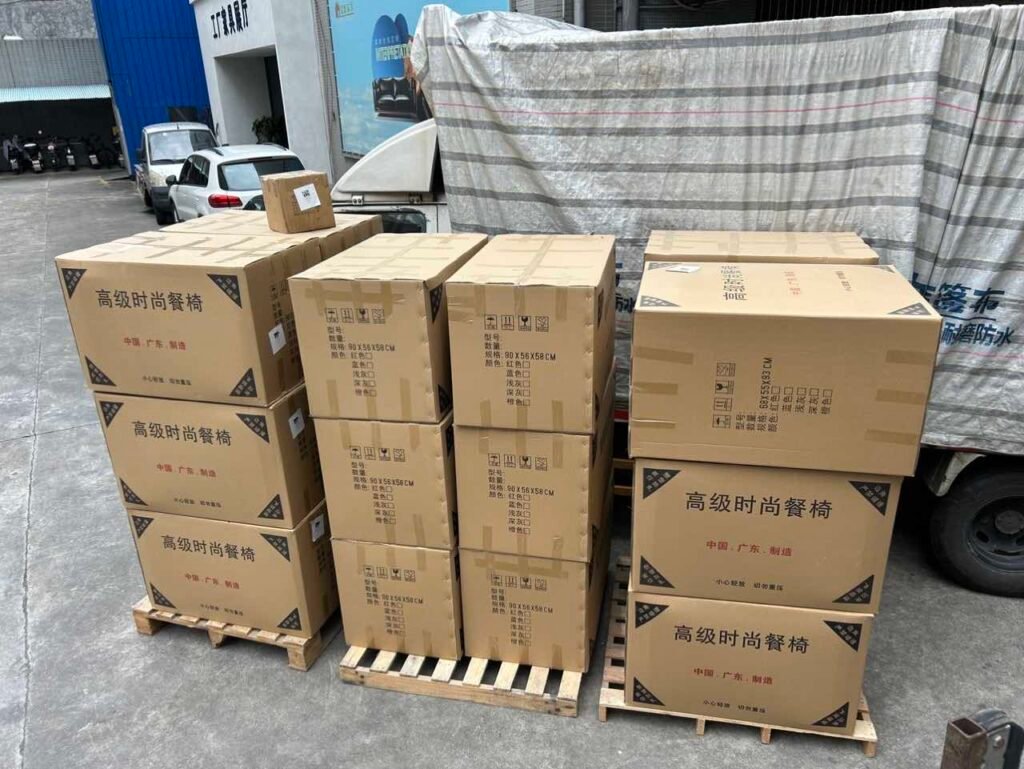
Attractive showroom displays don’t guarantee safe delivery. Standard cartons may be fine for local sales but aren’t suitable for export shipping.
Tip: Double-Check Packaging and Protection Measures — Especially for Fragile Items
Make sure to confirm whether the supplier provides wooden crates, cartons, or moisture-proof packaging, especially for heavy or fragile products like tiles and stone.
For example, tiles are usually quoted based on standard carton packaging, but for bulk export, they’re often palletized for forklift handling during container loading. This palletizing process may incur extra pallet fees, which should be clarified with the supplier in advance.
Case: One buyer in Foshan ordered a batch of aluminum doors and windows. Due to unclear communication — or perhaps an assumption — the supplier used only standard packaging (cartons with foam wrapping), without wooden crates. By the time the shipment arrived at the destination country, several glass panels had shattered, rendering those doors unusable.
10. Forgetting to Confirm Shipping & Delivery Terms
Suppliers usually deliver only within central Foshan. Deliveries to more distant warehouses or container yards often incur extra charges.
Tip: Clarify Delivery Scope — Especially for remote areas in Foshan
Suppliers in Foshan typically arrange local delivery to nearby showrooms or warehouses. In many cases, they can offer free delivery within certain zones in Foshan. However, if your delivery location falls in more remote parts of the city, suppliers often charge additional fees — so it’s crucial to confirm delivery terms upfront.
Case: A Senegalese buyer arranged loading at a warehouse in Lishui town in Foshan city, over an hour from central Foshan. Many suppliers refused free delivery and added surcharges. In total, extra fees reached $600–700, an expense that could have been avoided.
Conclusion
Foshan’s building materials markets are really large and you can find thousands of suppliers. Here there are incredible opportunities, but there are also hidden pitfalls for the unprepared. From vague order sheets to overlooked certifications, the risks are real — but avoidable.
By learning from these 10 common sourcing mistakes, you can save time, money, and stress while ensuring your project runs smoothly.
Foshan Page provides end-to-end sourcing services for building materials — from market guidance and translation, to purchasing, inspection, consolidation, and shipping.
For more Foshan market walkthroughs, factory visits, and sourcing tips, follow Foshan Page or visit our YouTube channel for real supplier tours.



